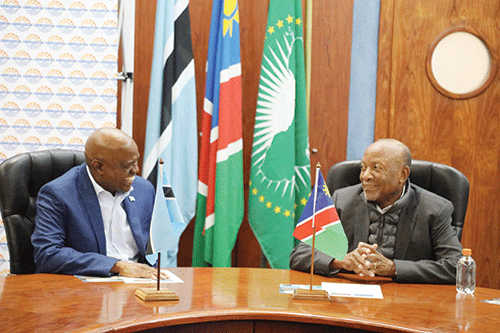SWAKOPMUND – The president of Botswana, Mokgweetsi Masisi, has said Namibia and Botswana want to ensure that citizens living along the borders and the security forces guarding the border get along.
He was responding to questions from journalists during his two-day working visit to Namibia when he and President Nangolo Mbumba reaffirmed their commitment to safeguarding their common border on Thursday.
Masisi said the two countries want to ensure the militaries and citizens living along the border on both sides get along to avert any conflict.
Namibia and Botswana share a 1 544-kilometre border from the common border with Zambia in the north to South Africa in the south.
“I think we are all familiar with recent past history, where there have been conflicts between our citizens and the military. Hence, we need to maintain peace, and ensure that we understand each other so that we never experience those sad moments again. We want never to go back there again,” he said.
One of the tragedies Masisi is referring to is the 2020 killing of three brothers, Tommy (48), Martin (40) and Wamunyima Nchindo (36).
They were killed alongside their cousin, Sinvula Muyeme (44), on 5 November along the Chobe River.
They were brutally shot and killed by Botswana Defence Force (BDF) soldiers on suspicion that they were part of a poaching syndicate.
The shock of their deaths was too much to bear for the mother of the Nchindo brothers, Alphonsina Mubu (69), who collapsed and died five days after her sons’ deaths.
A joint investigation team into the killing by the BDF later revealed that no firearm was found at the crime scene, which was allegedly, according to Botswana, used by the fishermen.
Kasane regional magistrate Taboka Mopipi has found that the BDF cannot be held liable for the deaths of the three Namibian fishermen and their Zambian cousin.
This resulted in the inaugural session of the Botswana/Namibia Bi-National Commission, held in Gaborone in September 2022, directing the NDF and BDF to develop a detailed plan to commence civil-military cooperation activities, targeting communities living along the border.
Following the commission, Namibia and Botswana signed a civil-military cooperation plan in May this year to determine opportunities for humanitarian intervention to improve the livelihoods of the people living along the common border.
Masisi said one of the ways to do this is to make sure that those in the military and organised systems on both sides understand what it means to live next to each other as two countries to avert further tragedies.
Also echoing similar sentiments, President Mbumba said the two countries want their citizens to live next to one another as brothers, instead of dealing with conflicts.
“If you have peace, then you will know that this is an affirmation of the stability between your two countries. We are emphasising here that we have peace. We want everybody to understand that our forces are not there for us to fight one another, but to protect our economic interests, maintain peace, protect our environment and wildlife, and ensure we are good neighbours,” he said.
Mbumba said having a military presence along the borders is an insurance policy for all.
“We thank the two ministers of defence for having started this type of practice so that a person, when you see a Namibian wearing a Namibian soldier uniform or a soldier wearing a uniform from Botswana, there is no need for running in fear or animosity to run to the chief, but should know that you are safe and protected,” the president added.



